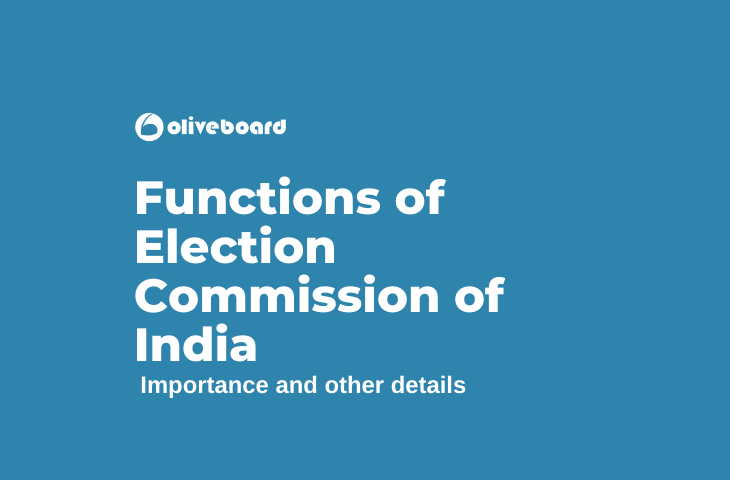The Election Commission of India (ECI) is a constitutional body founded on January 25, 1950. It is in charge of overseeing India’s Union & State election processes. ECI is a significant topic for the UPSC & other Govt Exams, and it is part of the Indian Polity syllabus. So it would help if you learned about the functions of the Election Commission of India.
The Election Commission of India
The Election Commission of India is responsible for conducting democratic elections. The ECI has the authority to direct, supervise, and manage elections to the Indian parliament, state legislatures, the president’s office, and the vice-president’s office. Some of the functions of the Election Commission of India are listed below:
- The Model Code of Conduct is enforced by ECI, which ensures that political parties and candidates follow it.
- ECI establishes election schedules to ensure that elections are held on a regular and timely basis.
- It creates and updates the electoral rolls regularly. It also makes a list of all eligible voters.
- The Indian Election Commission ensures that all political parties present audited financial reports regularly.
- It is responsible for holding elections for all the 543 parliamentary constitutions.
- It recognises political parties and provides them with election insignia.
- It also decides how constituencies are distributed geographically.
- It determines the location of polling stations, assigns voters to polling stations, and compiles & issues the electoral rolls and photo ID Card in Electronic Format.
- The Indian Election Commission serves as a court for resolving disputes. Disputes can arise over the recognition of political parties and the distribution of electoral emblems to them.
- It develops the timetable for radio and television advertisements of political group policy during election season.
- In the event of booth capturing, violence, misconduct, or other violations, the ECI is in charge of cancelling polls.
- ECI is responsible for auditing the election expenditure accounts that participants have deposited.
- It governs all political parties’ campaign expenditures per candidate without discrimination.
- ECI also advises the president about whether elections can be held in states governed by the president.
- ECI establishes campaign spending restrictions for all political parties, as well as monitoring them.
- ECI is also in charge of counselling sitting members of Parliament & state legislatures on post-election disqualification.
- It requires all political parties to submit annual reports to obtain the contribution tax benefit.
- The Elections Commission of India (ECI) selects tribunals to resolve uncertainties and disputes from elections to Parliament & State Legislatures.
- To publish a Model Code of Conduct for political parties and the candidates in elections so that no one engages in unfair practises or those in power misuse their power inappropriately.
- It’s in charge of appointing officers to investigate disputes about electoral arrangements.
- ECI is responsible for requesting the president or governor to provide the required personnel for the elections.
- It registers political parties for election purposes and provides them with the status of national or state parties based on their polling results.
The Election Commission’s Importance in India
- ECI takes an active role in ensuring that more people participate.
- ECI assists in ensuring that elections are conducted with the highest level of trust, impartiality, visibility, integrity, responsibility, liberty, & professionalism.
- It protects the Constitution’s objectives of equality, fairness, and neutrality and the rule of law in overseeing, directing, & controlling election governance.
- The Commission has imposed discipline on political parties, threatening to decertify them if they fail to uphold internal party democracy.
Conclusion
ECI plays a critical role in the organization of elections. We hope that this article will help you understand the functions of the Election Commission of India and its responsibilities.
FAQ’s
The election commission’s principal responsibilities include supervising, controlling, and conducting all elections to Parliament & state legislatures. Creating electoral rolls, assigning election emblems to political parties and candidates.
The President appoints the electoral commission’s members.
The Election Commission of India’s latest initiatives includes computerizing voter lists, simplifying account maintenance, & streamlining candidate registration procedures.
The Election Commission of India was founded on January 25, 1950.
Hi, I’m Tripti, a senior content writer at Oliveboard, where I manage blog content along with community engagement across platforms like Telegram and WhatsApp. With 3 years of experience in content and SEO optimization, I have led content for popular exams like SSC, Banking, Railways, and State Exams.
